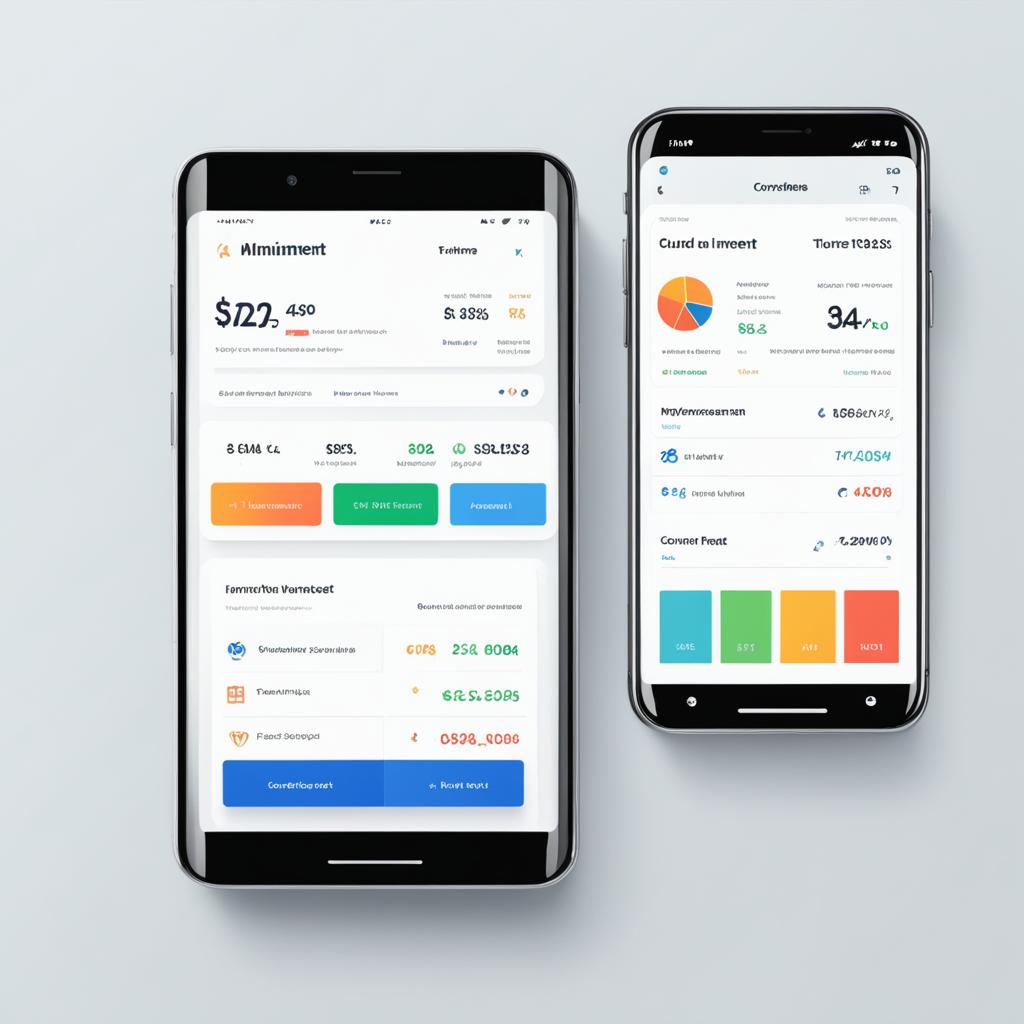Real estate crowdfunding platforms have revolutionized the way individuals can invest in real estate, offering opportunities for portfolio diversification and growth. Two popular platforms in this space are CrowdStreet and Fundrise. In this article, I will compare these real estate investment platforms to help you make an informed decision on which one is best for your investment needs.
Key Takeaways:
- CrowdStreet and Fundrise are real estate crowdfunding platforms that offer investment opportunities to individuals.
- Fundrise has a low minimum investment requirement of $10, making it accessible to a wide range of investors.
- CrowdStreet focuses on accredited investors and requires a minimum investment of $25,000.
- Fundrise primarily offers eREITs and eFunds as investment options, while CrowdStreet provides access to individual real estate deals and diversified funds.
- Consider your investment goals, risk tolerance, and preferences when choosing between CrowdStreet and Fundrise.
Fundrise: What it is and How it Works
Fundrise is a real estate investment platform that provides investors with access to proprietary real estate investment trusts (eREITs) and eFunds. With a low minimum investment requirement of $10, Fundrise offers a range of investment plans tailored to different investment goals.
The platform focuses on income-producing properties, allowing investors to generate passive income and diversify their real estate portfolio. By pooling investments from individuals, Fundrise acquires properties on behalf of its investors, providing access to commercial real estate assets that may otherwise be out of reach for individual investors.
Investing through Fundrise is simple and hassle-free. Investors can select from a variety of investment plans based on their risk tolerance and investment timeline. Whether you are looking to generate steady cash flow or achieve long-term growth, Fundrise offers options to suit your financial goals.
Fundrise charges an annual advisory fee and management fee ranging from 0.15% to 1.85%, which covers the costs associated with managing the platform and acquiring and managing real estate properties. These fees are deducted from investors’ assets and are transparently disclosed on the platform.
For a visual representation of how Fundrise works, refer to the table below:
| Investment Option | Minimum Investment | Investment Strategy | Fees |
|---|---|---|---|
| eREITs | $10 | Diversified portfolio of income-producing properties | 0.15% to 1.85% annual advisory fee and management fee |
| eFunds | $10 | Focus on specific real estate projects | 0.15% to 1.85% annual advisory fee and management fee |
Investing in real estate through Fundrise provides individuals with an opportunity to access the benefits of real estate ownership without the need for substantial capital or active management. Whether you are a new investor or an experienced one, Fundrise offers a user-friendly platform and a diverse range of real estate investment options to help you achieve your financial goals.
CrowdStreet: What it is and How it Works
CrowdStreet is a real estate crowdfunding platform that provides accredited investors with access to a wide range of investment opportunities in the real estate market. With a minimum investment requirement of $25,000, CrowdStreet allows investors to participate in individual real estate deals and diversified funds, including Real Estate Investment Trusts (REITs).
The platform caters to various types of properties, such as multifamily, single-family, industrial, and business properties, offering investors the flexibility to choose investments that align with their preferences and financial goals. CrowdStreet places significant importance on capital appreciation and risk management as part of its investment strategy, ensuring that investors have the potential to maximize returns while mitigating risks associated with real estate investments.
By leveraging technology and a robust network of sponsors and developers, CrowdStreet provides investors with a streamlined and efficient investment experience. The platform offers detailed information about each project, allowing investors to conduct thorough due diligence and make informed investment decisions. With a focus on transparency, CrowdStreet aims to foster trust and confidence among investors.
Investment Features of CrowdStreet
CrowdStreet offers investors access to a diverse range of investment features, including:
- Individual Real Estate Deals: Investors can directly invest in individual real estate projects, providing them with the opportunity to be part of specific properties that align with their investment strategy.
- Diversified Funds: CrowdStreet offers a variety of diversified funds, including REITs, allowing investors to gain exposure to a portfolio of real estate assets without the need to select individual deals.
CrowdStreet provides comprehensive data and analysis on each investment opportunity, empowering investors to evaluate potential risks and rewards. This enables investors to create a well-diversified real estate portfolio designed to achieve their financial goals.
The Crowdfunding Advantage
“Crowdfunding real estate platforms like CrowdStreet provide investors with access to a wide range of real estate deals and investment options that were traditionally only available to institutional investors. This democratization of real estate investing allows individuals to participate in the potentially lucrative real estate market with lower minimum investment requirements.”
Investing in real estate through crowdfunding platforms like CrowdStreet offers several advantages:
- Diversification: The platform allows investors to diversify their real estate portfolio across various asset classes and geographic locations, minimizing the risks associated with investing in a single property or market.
- Access: CrowdStreet provides accredited investors with access to a curated selection of real estate deals, giving them the opportunity to invest in high-quality projects that have been rigorously vetted by industry experts.
- Liquidity: While real estate investments are generally considered illiquid, crowdfunding platforms like CrowdStreet offer investors liquidity options, allowing them to sell their shares through secondary markets.*image
| Platform | Minimum Investment | Investment Options |
|---|---|---|
| CrowdStreet | $25,000 | Individual real estate deals, diversified funds |
| Fundrise | $10 | eREITs, eFunds |
*Table: Comparison of Minimum Investment and Investment Options between CrowdStreet and Fundrise
3 Important Differences Between Fundrise and CrowdStreet
When comparing Fundrise and CrowdStreet as real estate investment platforms, there are three key differences that investors should take into consideration. These differences include accessibility, fees, and investment options.
Accessibility
One significant difference between Fundrise and CrowdStreet is the accessibility of each platform. Fundrise is open to both accredited and non-accredited investors, making it available to a wider range of individuals. On the other hand, CrowdStreet primarily targets accredited investors, limiting access to those who meet specific income and net worth requirements.
Fees
Fundrise and CrowdStreet also differ in terms of fees. Fundrise charges advisory and management fees ranging from 0.15% to 1.85% annually. These fees are deducted from investors’ assets and cover the costs of managing and advising on investments. In contrast, CrowdStreet does not charge any fees directly to investors. However, investors may still incur fees charged by sponsors of the deals they invest in.
Investment Options
Another important distinction between Fundrise and CrowdStreet lies in their investment options. Fundrise primarily focuses on offering eREITs (real estate investment trusts) and eFunds. These investment vehicles provide investors with exposure to a diversified portfolio of income-producing real estate properties. On the other hand, CrowdStreet offers access to individual real estate deals as well as diversified funds, including REITs. This allows investors to choose between investing in specific properties or diversify their investment across multiple deals.
Overall, the differences between Fundrise and CrowdStreet can greatly influence an investor’s decision. The choice should be based on factors such as individual accreditation status, investment goals, preferred fee structure, and desired investment options.
To better understand the distinctions between Fundrise and CrowdStreet, let’s take a closer look at the following table:
| Fundrise | CrowdStreet | |
|---|---|---|
| Accessibility | Open to both accredited and non-accredited investors | Primarily targeted at accredited investors |
| Fees | Charges advisory and management fees ranging from 0.15% to 1.85% | No direct fees to investors, but potential fees from sponsors |
| Investment Options | Focuses on eREITs and eFunds for diversification | Offers access to individual real estate deals and diversified funds |
Fundrise vs. CrowdStreet: Which Investment Platform Should You Choose?
When it comes to choosing an investment platform for your real estate ventures, Fundrise and CrowdStreet are two prominent options to consider. The decision between the two ultimately relies on your individual investment goals and preferences. Let’s explore some key factors that can help you make an informed choice.
Accessibility and Minimum Investment
Fundrise appeals to a wider audience as it welcomes both new and non-accredited investors. With a minimum investment requirement of just $10, it offers accessibility and affordability to those looking to dip their toes into real estate investment. On the other hand, CrowdStreet primarily targets accredited investors and mandates a minimum investment of $25,000, making it suitable for more seasoned investors seeking higher control and customization.
Investment Options and Approach
Fundrise focuses on offering investment opportunities through its proprietary eREITs and eFunds, allowing investors to gain exposure to a diversified portfolio of income-producing properties. Conversely, CrowdStreet offers a range of investment options that include individual real estate deals, as well as diversified funds such as REITs. Consider the type of investment opportunities that align with your goals and risk tolerance.
Fees and Cost Comparison
When comparing fees between the two platforms, Fundrise charges advisory and management fees ranging from 0.15% to 1.85% annually. These fees are deducted from investors’ assets. On the other hand, CrowdStreet does not charge any fees to its investors. However, it’s important to note that investors on CrowdStreet may still be subject to fees charged by sponsors of the deals they invest in. Analyze the cost structure of each platform to ensure it aligns with your investment objectives.
Liquidity and Exit Strategy
Fundrise offers limited liquidity options through its quarterly redemption program, allowing investors to redeem their shares on a quarterly basis, subject to certain limitations. Conversely, CrowdStreet provides a dedicated secondary market that offers greater liquidity options, allowing investors to sell their shares at any time, subject to market conditions and buyer availability.
User Experience
Fundrise delivers a user-friendly platform with a simplistic website design, ensuring a smooth and intuitive experience for investors. In contrast, CrowdStreet provides a more detailed user experience with comprehensive data and information on each real estate project. Choose a platform that offers the level of detail and user interface that best suits your needs and preferences.
Considering these factors, carefully evaluate your investment goals, risk tolerance, and preferences to make an informed decision between Fundrise and CrowdStreet. Remember to conduct thorough due diligence and seek advice from a financial professional before making any investment decisions.

Fundrise Returns and Performance
Fundrise provides average annualized returns for the past several years, giving investors insight into the platform’s performance. It’s important to note that while past performance can provide valuable information, it does not guarantee future returns. Real estate investments are subject to market fluctuations and inherent risks.
Over the years, Fundrise has shown a range of returns. Recent years have seen returns ranging from 1.50% to 22.99%. These returns reflect the performance of Fundrise’s investment portfolio, which includes a diverse range of real estate properties and investment vehicles.
As with any investment, it’s essential to carefully consider your financial goals, risk tolerance, and time horizon when investing in Fundrise. Additionally, conducting thorough research and seeking advice from a financial professional can help you make informed investment decisions.
“Investments in real estate involve significant risks, including the potential loss of principal. Past performance is not indicative of future results. Fundrise allows individual investors to access real estate assets online. They strive to generate attractive returns through a diversified portfolio of properties across the United States. Fundrise expects to distribute income quarterly.”
CrowdStreet Returns and Performance
When evaluating the performance of any investment platform, it is crucial to consider historical returns and performance. CrowdStreet provides investors with valuable insights into the returns they can expect from their investments on the platform.
Based on a compilation of historical data from sold deals, CrowdStreet boasts an impressive average internal rate of return (IRR) of 19.2%. This figure indicates the potential growth investors can achieve through their investment activities on the platform.
Moreover, CrowdStreet showcases an average equity multiple of 1.58X, further exemplifying the platform’s ability to generate returns for investors. The equity multiple represents the ratio of total investment gains to the original investment amount.
“Investors on CrowdStreet have the opportunity to achieve solid returns by participating in real estate deals with attractive growth potential.” – Crowdstreet.com
Please note that historical performance figures should not be solely relied upon to predict future returns. Market conditions can fluctuate, and individual sponsor and deal due diligence remains essential to make informed investment decisions.
CrowdStreet Performance Overview:
| Statistic | Value |
|---|---|
| Average IRR | 19.2% |
| Average Equity Multiple | 1.58X |
Investing in real estate through CrowdStreet can offer the potential for attractive returns, but it’s important to conduct thorough due diligence and carefully evaluate individual deals to ensure they align with your investment goals and risk tolerance.
Example Deal Performance:
Here is an example of a recent real estate deal on CrowdStreet:
Property: XYZ Office Building
Investment Type: Office
IRR: 20.5%
Equity Multiple: 1.75X
This example demonstrates the opportunities for growth and returns that can be found on CrowdStreet. By conducting proper research and analysis, investors can discover potentially lucrative real estate opportunities.

Fundrise vs CrowdStreet Cost Comparison
When comparing real estate investment platforms like Fundrise and CrowdStreet, understanding the cost structure is crucial. Let’s take a closer look at the fees associated with each platform to determine which one aligns better with your investment goals.
Fundrise Fees
Fundrise charges advisory and management fees, which are deducted annually from investors’ assets. These fees range from 0.15% to 1.85% and are based on the value of your investments with Fundrise. This cost is relatively low compared to traditional real estate investments and offers an attractive option for those looking to diversify their portfolio with real estate assets.
CrowdStreet Fees
Unlike Fundrise, CrowdStreet does not charge any fees directly to investors. However, it’s important to note that investors may still encounter fees charged by sponsors associated with the individual deals they choose to invest in. These fees can vary and depend on the specific investment opportunity. It’s advisable to carefully review the sponsor’s terms and conditions to fully understand all associated costs.
Cost Comparison
Here’s a side-by-side comparison of the fee structures for Fundrise and CrowdStreet:
| Platform | Advisory & Management Fees | Additional Fees |
|---|---|---|
| Fundrise | 0.15% – 1.85% annually | N/A |
| CrowdStreet | N/A | Fees may be charged by sponsors |
As you can see, Fundrise has a transparent fee structure, clearly outlining the charges investors can expect. CrowdStreet, on the other hand, operates on a case-by-case basis, with fees determined by the sponsors associated with each investment opportunity. It’s important to consider your budget, investment goals, and tolerance for fees when choosing between the two platforms.
Visual representation of a cost comparison between Fundrise and CrowdStreet.
Fundrise vs CrowdStreet Minimum Investment Comparison
When considering real estate investment platforms, one of the important factors to evaluate is the minimum investment requirement. Let’s compare the minimum investment requirements of Fundrise and CrowdStreet:
| Platform | Minimum Investment Requirement |
|---|---|
| Fundrise | $10 |
| CrowdStreet | $25,000 |
Fundrise has a very low minimum investment requirement of just $10, making it accessible to a wide range of investors. This affordability allows individuals to start building their real estate portfolio with a minimal initial investment. On the other hand, CrowdStreet requires a higher minimum investment of $25,000. This higher threshold is due to CrowdStreet primarily targeting accredited investors who typically have a greater capacity to invest larger sums.
When deciding between Fundrise and CrowdStreet, it’s crucial to consider your investment budget and goals. If you have a smaller budget and want to begin investing in real estate with a modest amount, Fundrise’s low minimum investment makes it an attractive option. However, if you have a higher budget and meet the accreditation requirements, CrowdStreet may provide more investment opportunities and customization options.

Fundrise vs CrowdStreet Investment Opportunities
When it comes to investment opportunities, Fundrise and CrowdStreet offer different options to cater to investors’ diverse needs. Fundrise primarily focuses on eREITs and eFunds, providing investors with exposure to a diversified portfolio of real estate properties. On the other hand, CrowdStreet offers access to individual real estate deals and a variety of diversified funds, including REITs.
If you prefer a more hands-off approach and want a hassle-free way to invest in real estate, Fundrise’s eREITs and eFunds can be an ideal choice. These options allow you to diversify your investment across multiple properties without the need for active management. Fundrise’s platform provides a user-friendly experience, making it easy to monitor your investments and track the performance of your portfolio.
On the other hand, if you’re interested in having more control and flexibility in your real estate investments, CrowdStreet offers access to individual real estate deals. This allows you to choose specific properties that align with your investment strategy and goals. CrowdStreet’s platform provides detailed information on each project, giving you insights into the location, sponsors, and potential returns. You can also invest in diversified funds through CrowdStreet, which gives you exposure to a range of real estate assets.
Ultimately, the choice between Fundrise and CrowdStreet depends on your investment preferences and goals. Consider the type of investment opportunities you are interested in and which platform offers the options that align with your investment objectives. Whether you prefer a more passive approach with diversified portfolios or a more hands-on strategy with individual deals, both Fundrise and CrowdStreet provide valuable investment opportunities in the real estate market.
Fundrise vs CrowdStreet Liquidity
When considering real estate investment platforms like Fundrise and CrowdStreet, it’s essential to also examine the liquidity options they offer. Liquidity refers to the ability to buy or sell an investment quickly and easily without significantly impacting its price. Let’s explore the liquidity options provided by Fundrise and CrowdStreet:
Fundrise Liquidity
Fundrise offers a quarterly redemption program for investors, allowing them to redeem their shares on a quarterly basis. However, it’s important to note that there are certain limitations and redemption schedules involved. This means that investors may not have immediate access to their funds, and they may need to wait until the next redemption window.
CrowdStreet Liquidity
CrowdStreet takes a different approach to liquidity by providing a dedicated secondary market for investors. This secondary market allows investors to sell their shares at any time, subject to market conditions and the availability of buyers. The secondary market offers greater flexibility and control, enabling investors to access their funds when they need them.

It’s important to consider your individual liquidity needs when choosing between Fundrise and CrowdStreet. If you prefer more immediate access to your funds, CrowdStreet’s secondary market may be a better option. However, if you are comfortable with a quarterly redemption schedule and prioritize other factors, Fundrise may still suit your investment goals.
Fundrise vs CrowdStreet User Experience
When it comes to user experience, Fundrise and CrowdStreet offer different approaches to cater to the needs and preferences of investors. Fundrise takes a user-friendly approach with its simplistic website design, providing investors with an easy and streamlined experience.
CrowdStreet, on the other hand, offers a more in-depth user experience, focusing on providing detailed data and information for each real estate project. The platform’s emphasis on providing comprehensive insights allows investors to make more informed investment decisions.
When considering the user experience, it’s essential to assess the level of detail and user interface that best suits your needs and preferences. If you value simplicity and ease of use, Fundrise may be the platform of choice for you. However, if you prioritize access to extensive project information and a deeper analysis of potential investments, CrowdStreet may better meet your requirements.
| Fundrise | CrowdStreet |
|---|---|
| User-friendly platform | In-depth information for each project |
| Simplistic website design | Comprehensive data and insights |
| Streamlined investing experience | Focus on detailed analysis |
Conclusion
After comparing the features and benefits of Fundrise and CrowdStreet, it is clear that both platforms have their own strengths and appeal to different types of investors.
For new and non-accredited investors, Fundrise offers a low minimum investment requirement of just $10 and accessibility to a wide range of individuals. The platform focuses on income-producing properties and provides options for diversifying your real estate portfolio.
On the other hand, CrowdStreet caters primarily to accredited investors and offers the opportunity for more control and customization in real estate investments. With a minimum investment requirement of $25,000, CrowdStreet emphasizes capital appreciation and risk management as part of its investment strategy.
Ultimately, the choice between Fundrise and CrowdStreet comes down to your individual investment goals, risk tolerance, and preferences. It is important to carefully consider factors such as investment options, fees, minimum investment requirements, and liquidity when making your decision. Additionally, conducting thorough due diligence and seeking advice from a financial professional can help ensure you make informed investment decisions.
FAQ
What is Fundrise and how does it work?
Fundrise is a real estate investment platform that provides access to proprietary eREITs and eFunds. Investors can invest in these funds and earn returns through income-generating properties. Fundrise has a low minimum investment requirement and offers a range of investment plans.
What is CrowdStreet and how does it work?
CrowdStreet is a crowdfunding real estate marketplace targeted primarily at accredited investors. It offers access to individual real estate deals and a variety of diversified funds, including REITs. CrowdStreet emphasizes capital appreciation and risk management.
What are the key differences between Fundrise and CrowdStreet?
The main differences between Fundrise and CrowdStreet include accessibility, fees, and investment options. Fundrise is open to both accredited and non-accredited investors, charges advisory and management fees, and focuses on eREITs and eFunds. On the other hand, CrowdStreet is targeted primarily at accredited investors, does not charge fees to investors, and offers access to individual real estate deals and diversified funds.
Which platform should I choose, Fundrise or CrowdStreet?
The choice between Fundrise and CrowdStreet depends on your individual investment goals and preferences. Fundrise may be more suitable for new and non-accredited investors with its low minimum investment and accessibility. CrowdStreet may be more attractive to accredited investors seeking more control and customization. Consider factors like investment options, fees, minimum investment requirements, and risk tolerance when making a decision.
What are the returns and performance of Fundrise?
Fundrise provides average annualized returns ranging from 1.50% to 22.99% in recent years. However, past performance does not guarantee future returns, and real estate investments are subject to market fluctuations and risks.
What are the returns and performance of CrowdStreet?
CrowdStreet offers an average internal rate of return of 19.2% and an average equity multiple of 1.58X. These numbers provide an idea of the potential returns from investing on the platform, but it’s important to conduct thorough due diligence on individual sponsors and deals.
What are the fees associated with Fundrise and CrowdStreet?
Fundrise charges advisory and management fees ranging from 0.15% to 1.85% annually. These fees are deducted from investors’ assets. CrowdStreet, on the other hand, does not charge any fees to investors, but investors may still pay fees charged by sponsors of the deals they invest in.
What are the minimum investment requirements for Fundrise and CrowdStreet?
Fundrise has a low minimum investment requirement of just , making it accessible to a wide range of investors. CrowdStreet, however, requires a minimum investment of ,000 due to its target audience of accredited investors.
What are the investment options offered by Fundrise and CrowdStreet?
Fundrise primarily offers investment options through eREITs and eFunds, providing exposure to a diversified portfolio of real estate properties. CrowdStreet offers access to individual real estate deals and a variety of diversified funds, including REITs.
What is the liquidity like on Fundrise and CrowdStreet?
Fundrise offers a quarterly redemption program, allowing investors to redeem their shares on a quarterly basis. CrowdStreet offers a dedicated secondary market, providing more liquidity options for investors to sell their shares at any time, subject to market conditions and availability of buyers.
What is the user experience like on Fundrise and CrowdStreet?
Fundrise offers a user-friendly platform with a simplistic website design, providing an easy and streamlined experience for investors. CrowdStreet offers a more in-depth user experience with detailed data and information for each real estate project.
Our Friends
- https://www.modestmoney.com/fundrise-vs-crowdstreet/
- https://www.financialsamurai.com/fundrise-or-crowdstreet/
- https://financebuzz.com/fundrise-vs-crowdstreet
Money posts:
 CrowdStreet Review: Commercial Real Estate (2024)
CrowdStreet Review: Commercial Real Estate (2024)
 Yieldstreet vs. Fundrise: Which Platform is Best? (2024)
Yieldstreet vs. Fundrise: Which Platform is Best? (2024)
 Best Real Estate Investing Apps (2024)
Best Real Estate Investing Apps (2024)
 14 Best Real Estate Crowdfunding Platforms (2024)
14 Best Real Estate Crowdfunding Platforms (2024)
 13 Best Real Estate Investing Books (2024)
13 Best Real Estate Investing Books (2024)
 Streitwise Review – Is It The Best Commercial Real Estate Investment Platform in 2024?
Streitwise Review – Is It The Best Commercial Real Estate Investment Platform in 2024?
 13 Best Compound Interest Accounts & Investments (2024)
13 Best Compound Interest Accounts & Investments (2024)
 Arrived Review: Invest in Real Estate with $100 (2024)
Arrived Review: Invest in Real Estate with $100 (2024)

